“We played football with Ossetians in that field” a report from a divided village
On August 7, Russian troops resumed the process of the so-called “borderisation” of the Georgian-Ossetian conflict zone, between the territories controlled by Tbilisi and Tskhinvali.
Metal poles and barbed wired have gone up in the past few days, as a result of which residents find their orchards, vegetable gardens, pastures, family graves and homes taken from them.
The village of Gugutiankari has been severely affected and practically divided in two.
In the village of Gugutiantkari, you won’t find a family that was not affected by the August war.
JAMnews presents a report from Gugutiantkari – a village they talk more about the past more than they do about tomorrow.
_______________________
The gates to Amiran Margishvili’s courtyard are wide open.
Having just noticed us, the owner invites us in with a wave of the hand.
A table is set up in the garden right in front of the house. On the table are fried potatoes, a salad of fresh tomatoes and cucumbers, and between them a jug full of red wine (lomauri).
Hot nazuki and shoti bread are laid out on a tray. There are four people at the today.
Today is a special day: former neighbors have come to visit – a family who left the village after the 2008 war and moved to Gori.
“My heart could not stand it – for several days now, they’ve been talking about my native village [on the news]. I wanted to see my house”, says Khatuna, a middle-aged woman.
The media has indeed been talking about Gugutiantkari the past few days.
Since August 7, Russian troops have been erecting a so-called border here between the Tskhinvali region and the rest of Georgia.
Gugutiankari is part of the Gori municipality and is located 35 kilometers from Gori, but it is closer to Tskhinvali – just 18 kilometers away.
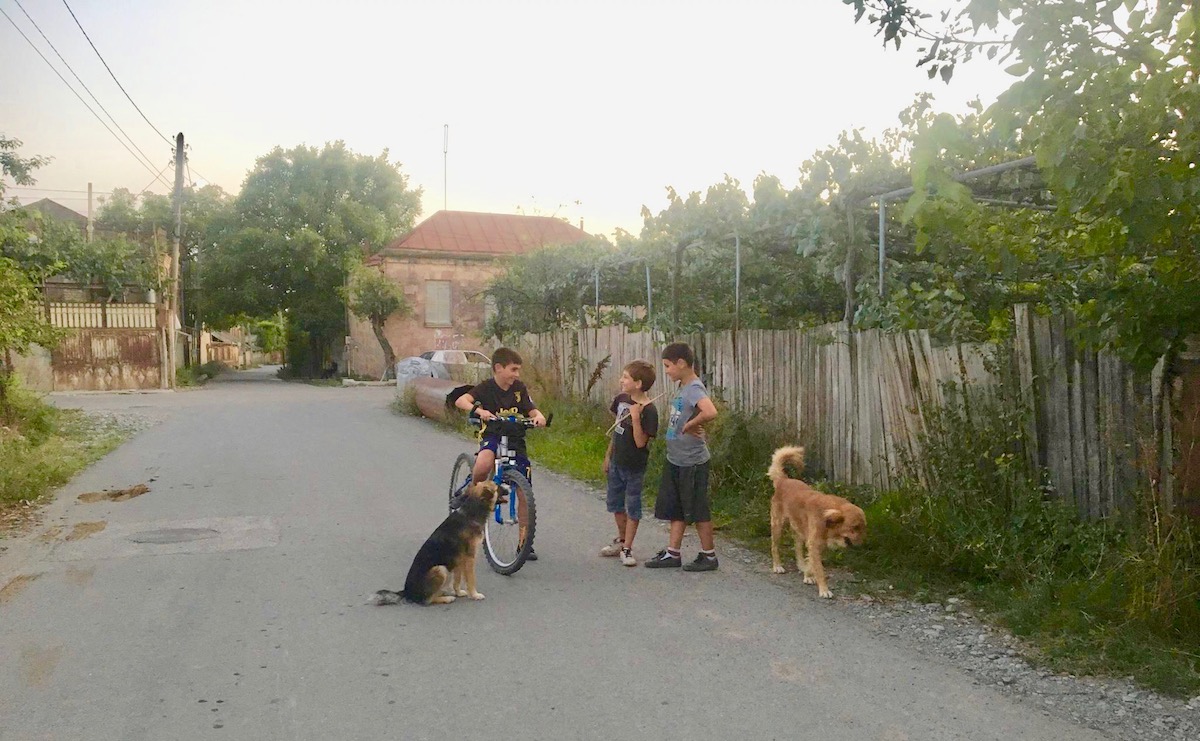
Before you get to Gugutiantkari, you must pass through a Georgian police checkpoint.
For several days now, the police have not let anyone pass without checking their documents.
Since the Russian soldiers resumed the ‘borderisation’ process, an identification card has not been enough to pass – even journalists need permission from the Ministry of the Interior.
Back at the table, the former neighbours recall stories from the past.
“Until recently, life here was in full swing,” said Amiran Margishvili, the 64-year-old head of the household says.
“Who could imagine what is happening here today! I used to play football with Ossetians in that football field over there. I still remember their names. Since the war, I haven’t heard anything from them.”
Another pipes up:
“Remember the taxi driver Vasya? He used to bring Ossetians over here on holidays. Whenever they called him, he never refused. And sometimes during the night he had to make several trips in order to bring all the guests home”, recalls Neli Metreveli.
Residents of Gugutiankari were especially close friends with residents of the villages of Khelchua and Disevi. The Georgian side lost control of the villages after the 2008 war.
The conflict divided many families, relatives and loved ones.
“Remember the store in Khelchua? Everything was sold there, nothing had to be brought in from Gori. Ossetians and Georgians would go there to chat and gossip. I owed 21 lari to the store…and to this day I haven’t been able to repay them. I would take flour and repay them, everyone trusted each other. And then the war began…”, Khatuna Pichkhnarashvili, a guest of the Margishvili family from Gori, says, joining in the conversation.
After the war, Khatuna and her family left their house in Gugutiantkari and moved to Gori for temporary residence.
In early August, Russian troops laid a new line of occupation right in front of her two-story house with a small courtyard. Today, the house is in ruins. The weeds are so tall they cover the windows of the first floor.
“After the war, we left the village. The house has been so severely damaged, it is impossible to live in it. And it’s scary – the Russians stand right there. And now the barbed wire near the house has been extended. There was a tiny hope of being able to comeback, but now it is gone”, says Khatuna.
With tears in her eyes, she says that Gugutiantkari is already firmly in her past.
“But I wasn’t able to really start a new life either. We received the status of internally displaced person and temporary housing. We have been waiting for years, but we have not yet been able to get back our own home”, she says.
Borderisation
Russian security services and representatives of the de facto government of South Ossetia started the ‘borderisation’ process in 2009, a few months after the August war.
The goal of this process is to turn the administrative border of Georgia with South Ossetia / Tskhinvali region into an interstate border.
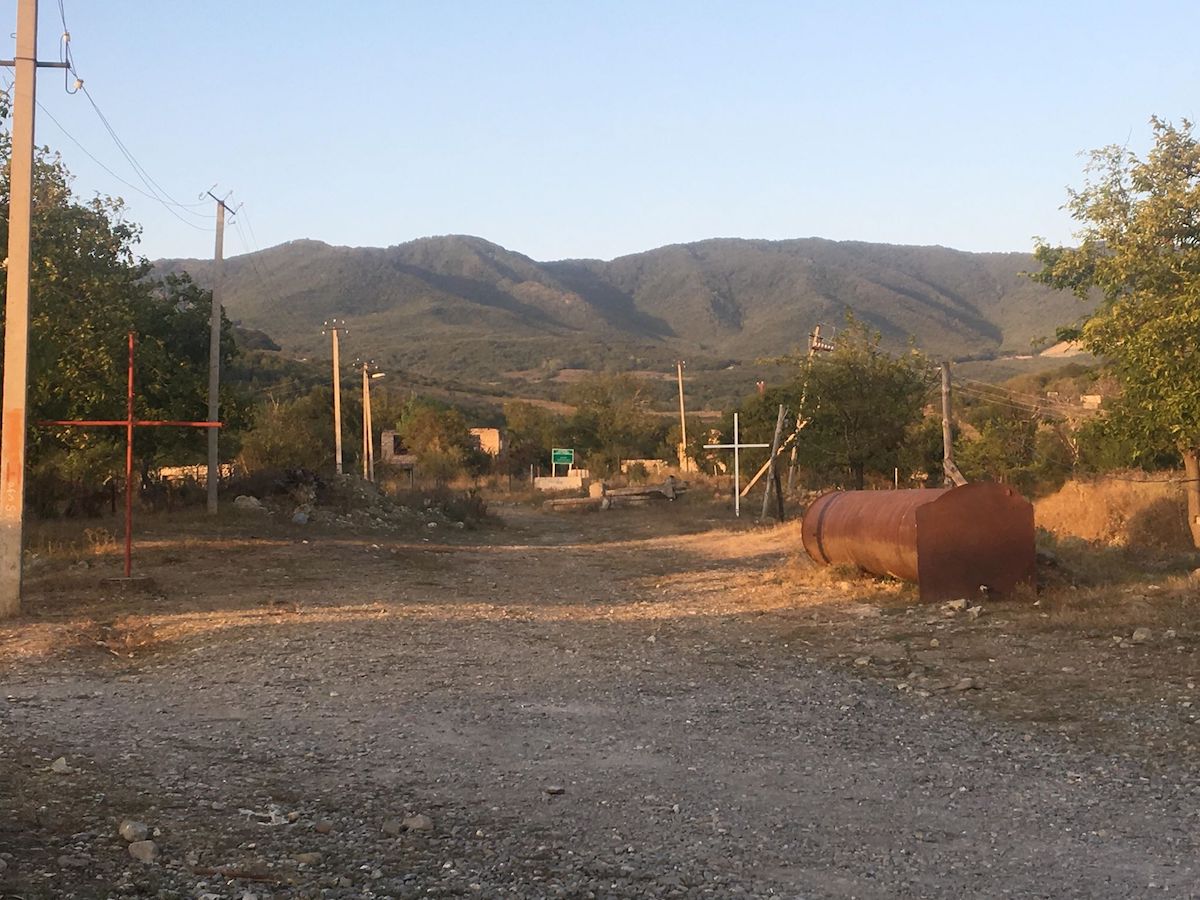
The process is largely carried out by the Russian military.
They stretch barbed wire, build metal and wooden fences, dig trenches and fire ditches, mount border signs and install electronic monitoring infrastructure.
Tbilisi calls this process a creeping occupation. And the de facto authorities of South Ossetia call it “the construction of the state border.”
Tbilisi argues that the Russian military often takes up territory still under Georgian control.
The Russian military, in turn, argues that they are guided exclusively by maps of the Soviet period and the so-called state border of South Ossetia is laid precisely along the administrative border of the former South Ossetian Autonomous Region indicated on these maps.
The Georgian Ministry of Defense has confirmed to the non-governmental organization Institute for the Development of Freedom of Information (IDFI) that “Russians use topographic maps of the General Staff of the USSR Armed Forces, published in 1976-1986.”
But at the same time, the Ministry of Defense noted that the Russian military uses maps on which the border of the South Ossetian Autonomous Region is drawn in different ways.
In addition, the Russian military does not take into account the fact that some structures have appeared in the region since the time of mapping. As a result, 11 years after the war, in the conflict zone, people living in the territory controlled by Tbilisi are still losing their houses and plots, fields and gardens, graves of relatives and relatives and water sources.
New refugees
Gugutiankari is one of the villages most affected by the ‘borderisation’ process. The first border banner with the inscription “Republic of South Ossetia” appeared here back in 2013.
It was then that the Russian border guards began marking the border, and this Georgian village was practically divided in two.
“11 years have passed since the war, but war and occupation in our village are still ongoing,” local residents say.
Gugutiantkari was hit hard during the 2008 war. Many residents lost their homes – some burned down, others were entirely shelled or bombed.
Initially, the ‘borderisation’ process tore away from the village only land plots and gardens that were on the other side of the wire.
However, today, it has left two families without homes. The homes of Lavrentiy Gugutishvili and Givi Razmadze have now ended up on territory controlled by Tskhinvali.
Both buildings, it must be said, were unsuitable for living in after the war in August 2008 and were empty. The owners hoped to restore their ancestral homes, did not disregard their yards and gardens, they used the surrounding land and they grew fruits and produce to make a living.
“We were given three days to collect a harvest, to take metals and other materials for further use from the home”, Givi Razmadze says.
Today he and his family live in Gori in a refugee village.
After the war, he received the status of a forcibly displaced person and monetary compensation, for which he has managed to buy a small cottage.
A village of bachelors
Gugutiantkari was once considered a large village. Today, every third house is closed. Locals are already used to living in constant tension.
Despite the fact that the Russian military are standing its on the outskirts of the village, locals try to live life as usual.
They work in their apple orchards, the children go to school, ride bicycles and play. Families receive guests, set tables for feasts and celebrate birthdays…
“People are leaving our village, they don’t want to linger here for a long time,” says Mariam Mandzhavidze. She teaches Russian language and literature to the children of a Russian-occupied village.
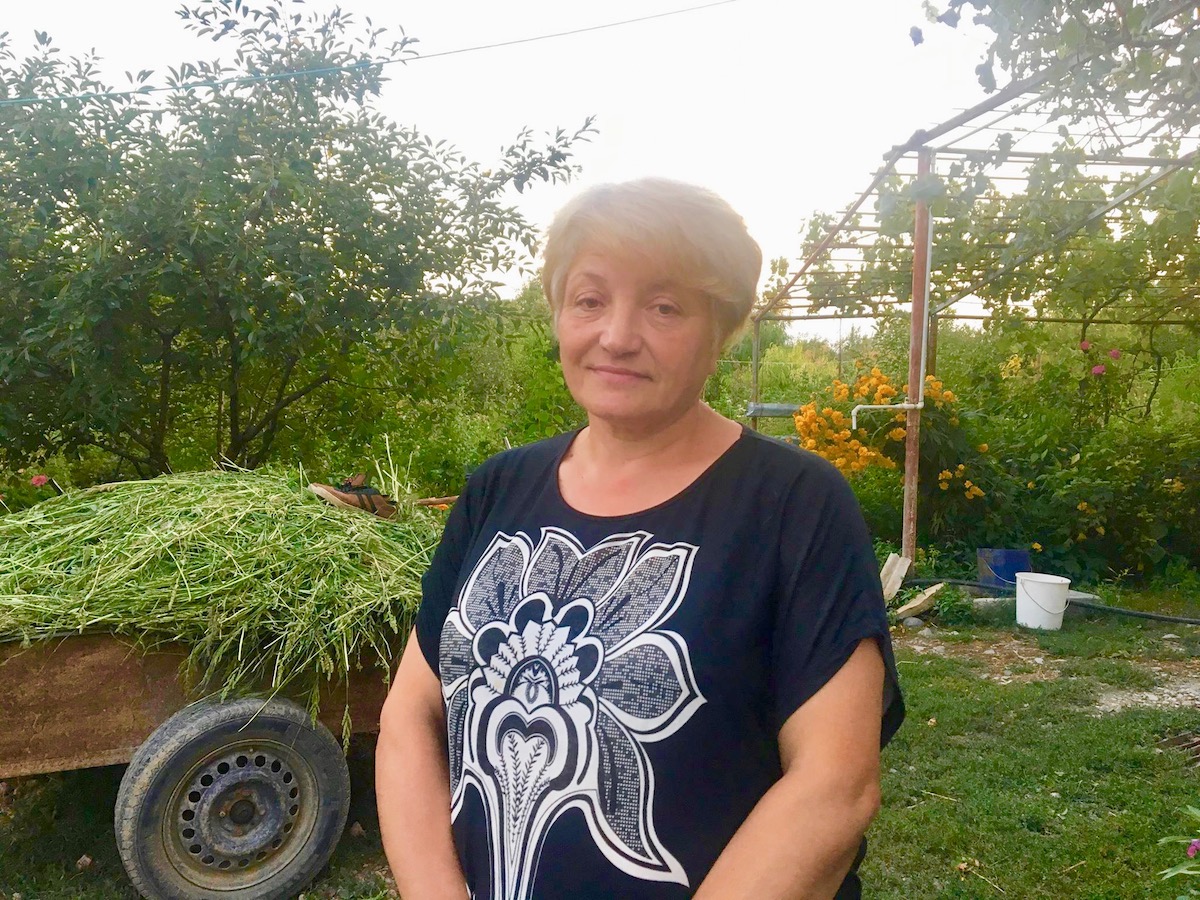
She has been teaching Russian language and literature for 30 years at the Mereti school – a village bordering Gugutiantkari.
There is no school in Gugutiantkari.
Therefore, 34 students from Gugutiantkari study in Mereti.
A bus takes the children to Mereti in the morning and brings them back after school. Mariam says that the commute is difficult on the children.
“Today I have 10 students from Gugutiantkari. When I entered their class for the first time, one of them stood up and announced that he could not stand Russia, the Russian language, and would not be able to treat me with respect, because I teach this language”, recalls Mariam.
Before the war, 500 children studied at a school in Mereti, today there are just 170.
“And this despite the fact that people are specially registered in Mereti in order to receive state funding for higher education. It is free for our children. But still they don’t want to stay”, the teacher says.
The only source of income for local residents is orchards.
Young people work in the orchards to receive some pocket money.
Gugutiantkari was also included in the ‘mountain law’, thanks to which residents utility bills were halved, but for many, it is still incredibly difficult to pay.
“Everywhere the hardships of life are felt. If you look closely, almost all the young men are bachelors. There is no reliable income to start a family. Girls are leaving, getting married. Well, who wants to spend their lives here?! We can’t find a young family. Every evening, when I take out the garbage, I count the locked houses and barely hold back my tears,” says Mariam.
Last fall, dozens of Gugutiankari families, in addition to all their troubles, also lost social assistance. One of these is 92-year-old Sardion Gugutishvili.
“Immediately after the presidential election, many people lost their social assistance. People received different reasons. Only my pension was left, and even that was completely spent on medicines – after the war I started to feel dizzy. Even now, if I get up too quickly, I get dizzy, my sight darkens”, says Gugutishvili, who has perched himself on a bench across from his house.
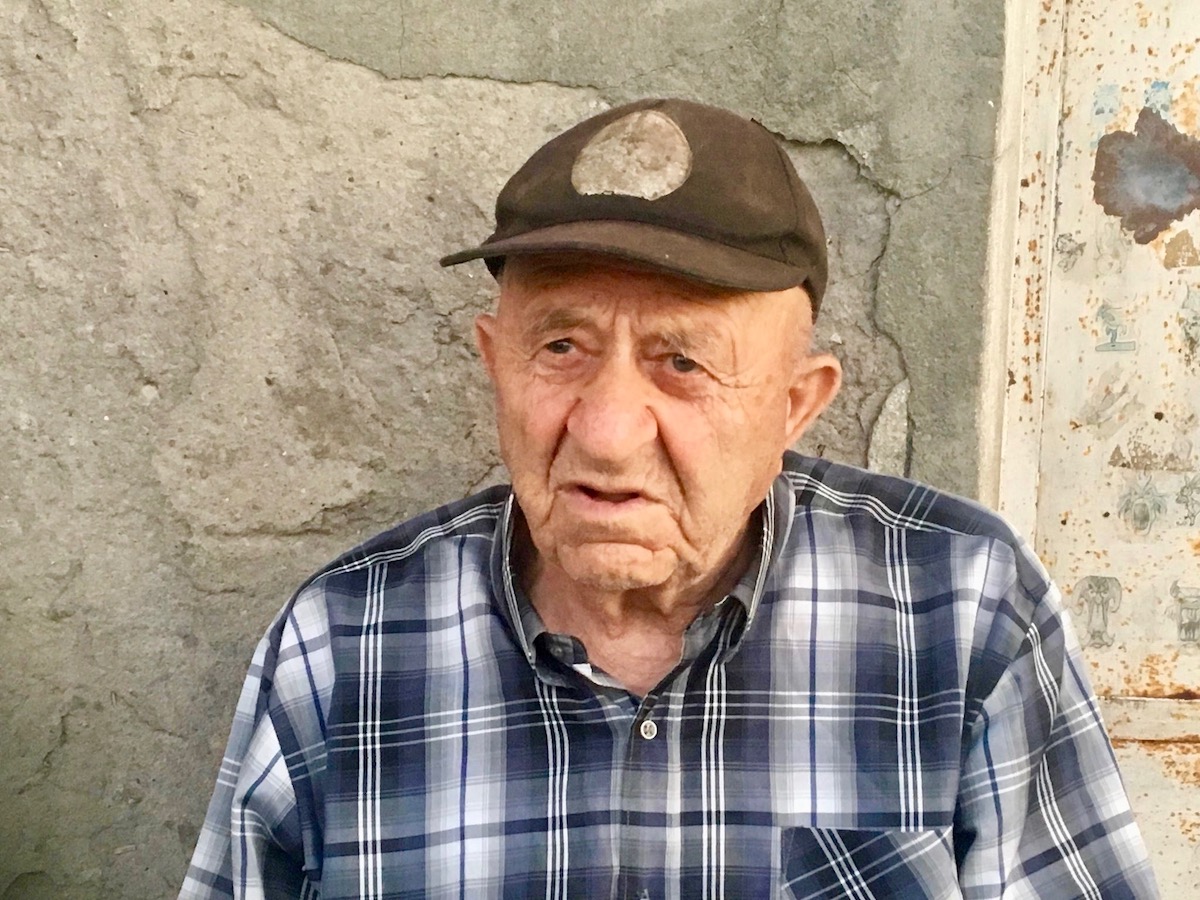
Immediately after the loss of his social benefits, he lost a land plot in the ‘borderisation’ processs.
For many years, Gugutishvili grew walnuts and pears. He sent part of the harvest to the city – part of his family left Gugutiantkari. What remained he would sell in the village.
“The earth is not bad here. Thanks to the land, the people survive. You could even sell your crops right here. Buyers came from Gori. But now there is nothing left. The land has been lost. My twenty acres is already on the other side. I’m already old, I understand I won’t make it to see the return of my land”, Gugutishvili says.
The weather has also been harsh with local residents. Twice hail has destroyed their gardens. There will be no harvest. And the villagers are wondering what kind of state assistance they can count on.
“Our problems do not end there. There is no irrigation water, a pipe was drawn from the Disevur River, but after the war the canal ended up on occupied territory. Somehow they dealt with this – last year a canal was extended from Liahvi. That’s how they preserved our apple orchards. But this year, nature has betrayed us. The authorities promised to help – a representative of the mayor said that there would be compensation at the rate of 200 lari per hectare. But in reality, nothing has been done so far”, said Neli Metreveli, a resident of Gugutiantkari.
Three of her children help Neli work on the land. In the yard near Metreveli, wooden boxes prepared for packing fruit are stacked in several rows.
“I can see with my own eyes what Russia is doing here,” Neli says.
“But I already know that my family lived much better when the crops were exported to Russia. I am not against the European market that we are being told about. It will be great for the whole country. But where is it, this European market, how to get there? Nobody has talked to me about this issue, nor have they offered help. I am with my family, left alone with our problems. And therefore is it really that surprising that I continually recall the time when we had a better life? It’s very difficult to live when you don’t know how to make it until next year.”
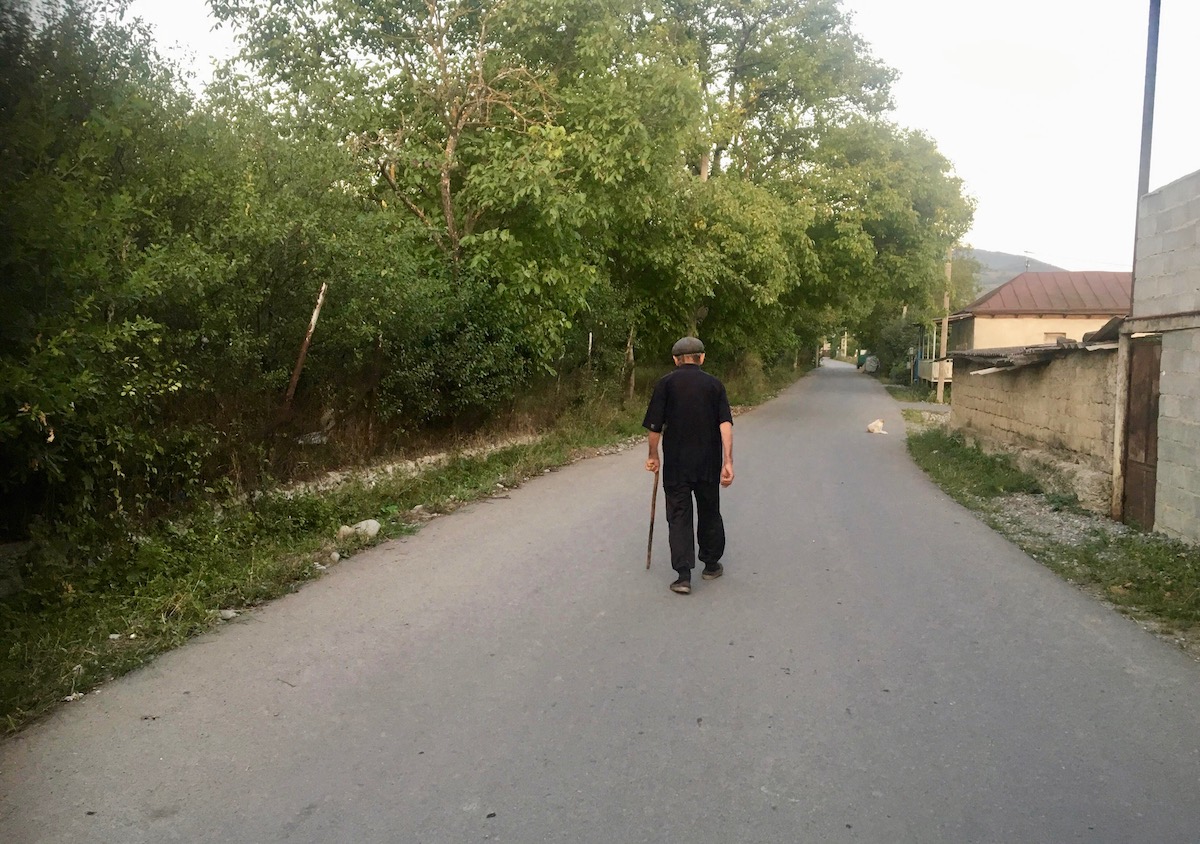
Toponyms and terminology used in the article, as well as views, opinions and strategies they contain, do not necessarily reflect the opinions of JAMnews or any of employees thereof. JAMnews reserves the right to delete comments it considers to be offensive, inflammatory, threatening or otherwise ethically unacceptable.



















